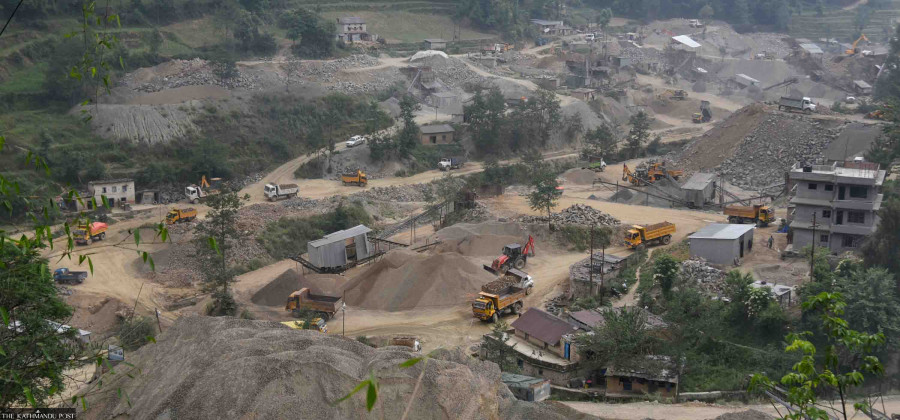Money
Illegal crushers allowed to run temporarily as construction projects come to halt
The government, however, has set a condition that illegal crusher plants have to be registered and pay taxes by mid-July.
Pawan Pandey
The government on Wednesday decided to allow “illegal” crusher plants to operate temporarily, setting a condition that they have to be registered and pay taxes by mid-July.
Wednesday’s Cabinet meeting took a decision to allow crusher plants to operate as the shortage of riverbed materials like sand and gravel started to hit the development works.
After the end of monsoon, the October-March period is the peak time for construction activities.
“We welcome the government decision,” said Sita Ram Neupane, president of the Federation of Nepalese Crushers and Mines Entrepreneurs’ Association. “The meeting has also decided to form a committee, including representatives from crusher plants, to formulate laws for the operation of crusher plants beginning the next fiscal year.”
“We hope the government won’t delay the formation of the committee.”
Construction projects across the country have ground to a halt for lack of sand and gravel after the government shut down illegal stone crushing plants, officials said.
Work has stopped at the Rs22-billion Nagdhunga Tunnel Project, slated for completion on April 26, for 10 days, according to Madhav Prasad Adhikari, deputy project chief.
“Construction projects that require sand have stopped completely,” said Adhikari. “The contractor has claimed compensation for the stoppage, but it has not been approved yet.”
As of the first week of January, the project had achieved around 48 percent physical progress. The financial progress is 50 percent. The construction of the project began in October 2019.
Nearly 75 percent of the crusher plants across the country were shut down from the beginning of January following a circular from the Home Ministry.
The ministry, on January 4, directed the District Administration Offices to immediately shut down crusher plants involved in quarrying and processing stone, gravel and sand that were operating without registration or updated permits.
The ministry also asked the offices to investigate and immediately shut down quarrying that has continued even after the completion of various development projects for which the plants and contractors concerned were granted permission to extract stone, gravel and sand.
There are around 1,200 crusher plants across the country. Among them, 890 have been closed so far following the circular, according to the ministry.
Ministry officials say they have followed the Supreme Court’s order and directed all the factories operating illegally to close down. Operators of crusher plants have questioned the intent behind the government’s abrupt decision.
Fadindra Mani Pokharel, spokesperson for the Home Ministry, told the Post last week that the ministry had only followed the apex court’s order.
Pokharel claimed the ministry’s decision has not affected the plants that are operating legally.
The Supreme Court in June last year issued an interim order not to implement the amended provisions on the standards for extraction, sales and management of stones, pebbles and sand.
The amended standards introduced in May last year had allowed crusher plants to be set up closer to forests, human settlements, rivers, highways, religious, cultural and archaeological sites and transmission lines than before.
The Federation of Nepalese Crushers and Mines Entrepreneurs’ Association, in a statement issued last Friday, asked the government why it had implemented the order months after it was issued by the Supreme Court.
“The court had issued the order on July 20, but why did the government implement it only on January 4 to affect construction work including those which were set to begin after the election?” it said.
“We would like to inform all concerned that it is against the spirit of the law for the District Administration Offices to prevent plants which have been registered in accordance with the law and hold licences from engaging in excavation, production and distribution of stones, gravel, sand and pebbles.”
Hari Kumar Pokharel, project director at Pushpalal (Mid-Hill) Highway Project, said the closure of crusher plants in recent weeks had created shortages of sand and pebbles.
“Work requiring sand and pebbles has been affected at various places,” said Pokharel. “Only those projects that have ample stocks of these construction materials are continuing work at the moment.”
Kedar Prasad Nepal, project chief of the Bridge Sector, Kathmandu under the Department of Roads, seconded Pokharel, adding, “The contractors have already submitted applications saying they will not be able to continue work due to lack of construction materials following the closure of the crusher plants.”
Chuda Raj Dhakal, project coordinator of the Road Improvement and Development Project under the Department of Roads, said work had stopped for the past seven days.
Dhakal questioned why the crusher plants that have not been declared illegal by the government too had stopped operating.
“The government has only issued a circular to shut down the illegal plants,” said Dhakal. “But it looks like the illegal plants have barred the legal ones from operating too,” he said.
The concern of the government regarding illegal excavation of sand and pebbles from the Chure region and its transportation to India is valid, but the recent circular has affected construction work across the country besides providing an excuse to slowpoke contractors to blame the delay on the shortage of materials, according to Dhakal.
Devendra Karki, former government secretary, who once headed the energy and physical infrastructure ministries, said there might be a weakness in the formation of guidelines or there may be poor monitoring, but once it goes into effect, it should be followed. “You have to follow the rule from day one. However, the rules can be amended if it is not workable.”




 20.12°C Kathmandu
20.12°C Kathmandu













